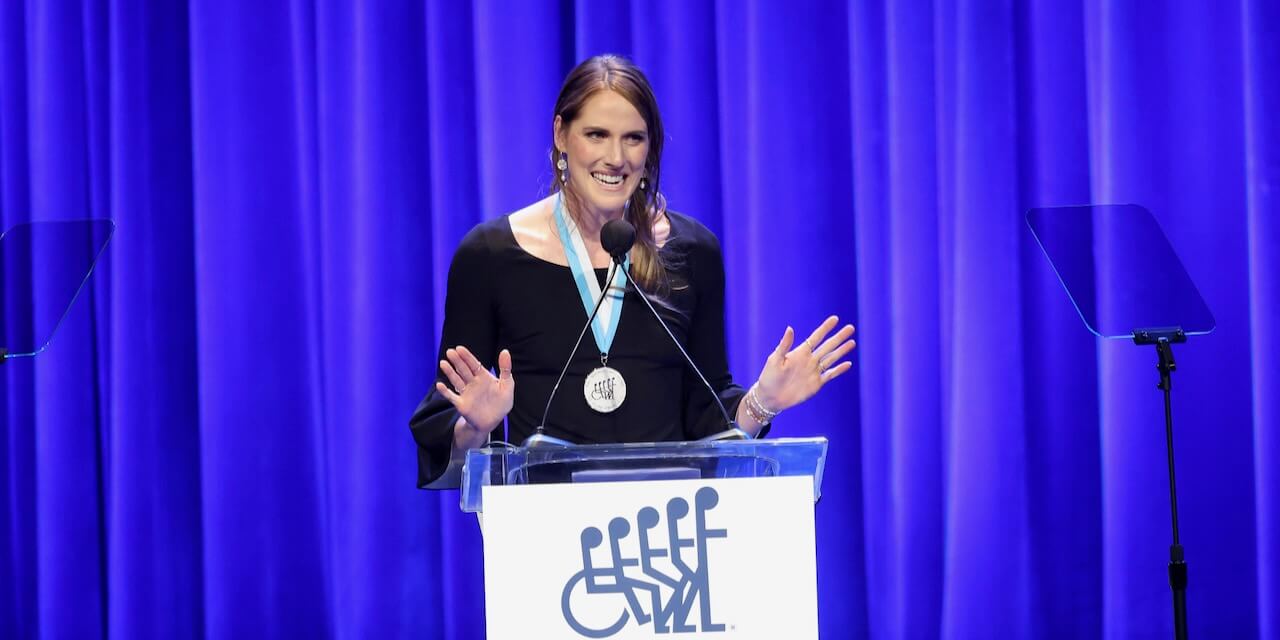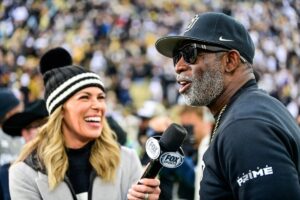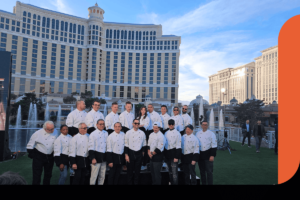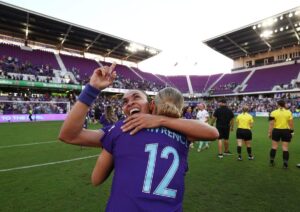
Editor’s note: This article is part of our “Origin Stories” series, focusing on the backstories of athletes and topics around the Summer Olympics.
The world has seen two very public sides of Missy Franklin — the bubbly, vivacious 17-year-old star who won four gold medals at the London Olympics in 2012, and the devastated 21-year-old who did not qualify for finals in either of her individual events in 2016 in Rio de Janeiro, Brazil. Franklin would later say that she felt like “swimming broke up with (her)” at the Rio Games and that it was the most difficult thing she’s ever experienced.
After trying and failing to fight through excruciating shoulder pain, Franklin officially retired from competitive swimming in December 2018. She faced the question that all ex-elite athletes stare down at some point: What happens next?
It’s a scary question, and it took her time to figure out the answers. She is now comfortable in retirement, adding the labels of wife, mom and philanthropist alongside former swimmer. In early January, she will add another: She’s starting a new podcast, “Unfiltered Waters,” with fellow swimmer Katie Hoff.
The Athletic recently caught up with Franklin for a wide-ranging conversation about the origin of her love of swimming, her relationship to the sport in retirement, and all of the ups and downs that happened in between.
I was recently rereading the first-person essay you wrote for ESPN when you retired. At the end, you mentioned being ready to start the rest of your life, and it seems like you have found areas that are fulfilling to you. But I can imagine for an athlete, retiring at a relatively young age could be really overwhelming or challenging? Or maybe exciting?
At first, it was definitely overwhelming and challenging. This is something that I’m super vocal about now because, as a sporting community, I don’t feel like we do enough to prepare athletes for that transition, for retirement. Ideally, you’re not retiring when you’re 23 years old, like I did. But no matter what age you retire, if sports has been a big part of your life for a long time, you don’t have other job experience and there’s never a Plan B because your sole focus and energy and time has been being an elite athlete. And then it’s not like it’s this smooth transition out where you’re slowly weaned off of it. It is cut off. You are cut off from this thing you’ve done your whole life. The next day, it is gone. There’s just so much emotional trauma that goes through that, that process and that decision.
When I retired, there was a lot of fear. I had no idea what was going to come next. I had no idea what my future looked like. It was just a lot of self-trust and me knowing that what I’ve always had more than anything is a work ethic. I just had to lean on that and know that what’s going to come next is going to require a lot of work. Swimming has given me this platform that I want to be able to continue to use and grow. And that was our starting point.
That must have been hard.
I literally thought that once I was done swimming, I didn’t know how I was going to make a living. And so now, the fact that I’m able to make a living and contribute to our family, financially and emotionally, and I’m still able to be there for my daughter every second of every day while doing what I love — it’s like it all just is utterly a dream come true. And it turned out so much better than I could ever have imagined as a 23-year-old absolutely terrified of what she was going to do with the rest of her life.
So, what led you to start this podcast specifically? And how did you figure out what you were going to cover?
It was (Hoff’s) idea. … In the simplest terms, our podcast is about discovering the person beneath the athlete. We want our listeners to get to know our athletes, learn more about their careers, but also who they are as people and what things bring them happiness and joy and fulfillment because we feel now having been spectators of the sport and other sports, of course, you feel more emotionally invested when you feel like you know the person that you’re watching.
So far, our guests have just been so lovely. They’ve been really vulnerable. So we’ve been having wonderful conversations, and I think it’s going to be so powerful for our audience to hear these elite, elite athletes — the best in the world — talk about their struggles and their hard times and how they overcame them, but also the moments that make it worth it and what they’re learning outside of the water. We’re starting in the swimming space because that’s what we know best, but our dream is to expand as far as this will go.
It’s interesting that you mention starting with swimming and athletes in it, because I know you really struggled with how you felt about the sport toward the end of your career, particularly in Rio. I wanted to know what your relationship with swimming is like these days.
I want to say hit or miss, but that’s not the right way to describe it. I would say my relationship with swimming today is that I will always love it. I will always appreciate it. But even at this point in my life, I still need to step back from it every once in a while. Something that I learned along my own journey is that if I don’t take that step back, that’s when my self-worth can get too wrapped up in the sport. When I was competing, it was my self-worth getting wrapped up in my success and my failures and feeling like I was a better person and a better human if I was competing well versus if I wasn’t and that somehow reflected who I was, which in no way it actually did.
Do you swim at all anymore? I know you were dealing with some serious shoulder pain.
I really did not swim for five years after I retired, but the bug just hit me a little bit this past fall. I think it was because my husband was training for Ironmans this year. He was doing a good bit of swimming again. He would kind of come home at 7 a.m. already gotten his swim workout in, smelling like chlorine. And I was like, “Oh man, I think I miss it.” So, I actually got all my equipment again. I’m feeling ready to start up here pretty soon. Nothing serious. I think I’m honestly just going to start off going to the pool by myself. I might eventually join a Masters team just for fun, but we’ll see what my body is going to allow me to do at this point. I’m pretty much just one speed, but I’m perfectly fine with that. I can’t push it too hard.
I will go to my grave saying it is just the best form of exercise. It is so low-impact. It’s available to everyone and any stage of your life, and I think that’s something that’s so beautiful about it.
So, how did it all begin? How did you fall in love with this sport as a little girl, and when did you realize you were quite good at it?
I got started in the sport because my mom was actually terrified of the water. She didn’t learn how to swim until she was in her 30s, and that is why I do so much work with the USA Swimming Foundation around drowning prevention and swim lessons and saving lives. My mom didn’t want to pass that fear on to me. She put me in a “mommy and me” class at our local YMCA when I was six months old. I did everything else growing up to see what I love. …
My parents let me gravitate towards what it was that I loved, and that was always swimming. I was swimming, basketball and soccer until I was like 9 or 10 years old, and then I really solely focused on swimming because I made my first Olympic trial cuts when I was 12, and I competed there when I was 13. I was one of the unique scenarios where that talent and that hard work were showing very, very early on, and it was also truly the sport that I loved the most. I went to trials in 2008, and that was kind of my “ah-ha” moment, even as a 13-year-old obviously not expecting to make the team, but I’m seeing the athletes that are on posters on my wall back home. I’m seeing Katie Hoff. I’m seeing Natalie Coughlin. Ryan (Lochte). Nathan (Adrian). Michael (Phelps). I’m swimming literally in the same pool as they are so, like, why not me?
Leaving that meet, I looked at my parents, and I was like, “Four years from now, I’m coming back, and I want a shot at making the Olympic team. I need a lane and an opportunity. So, I’m going to spend the next four years doing whatever I can to make that happen.” And I came back four years later and made my first Olympic team at 17 years old in seven events.
What was London like? How much did your life change based on what you were able to do there? And how great did it feel to achieve those lifelong dreams, the goals that you set as soon as you decided you wanted to be a swimmer?
It was wild. That would be crazy for anyone, let alone a 17-year-old. It was incredible. At that time, I had a bit of naivety that actually worked in my favor. I understood that it was the Olympics, but also at the exact same time, it was just another swim meet. That gave me so much confidence and ability while I was there to not get overwhelmed, to not psych myself because it was the Olympics. Instead, it allowed me to just go out there and swim and have fun, which is exactly what I did. Coming home and having your whole life flipped around because you were just out there swimming was wild to me. It was hard for me to wrap my head around that.
I’ll be honest with you. When I got home, I was equally recognized for being the Olympic swimmer — and for being the girl from the “Call Me Maybe” video. It was so funny. I loved that. I mean, that was just such a special experience. It was a crazy mix of being so happy, so overwhelmed, so honored, and I truly recognized I really was a role model at that point. That’s a big responsibility at any point in your life, but it was one that I took so seriously, and that never felt like a burden to me.

Missy Franklin won four gold medals in London as a 17-year-old, becoming a new star of U.S. swimming. “I truly recognized I was a role model at that point,” she said. (Heinz Kluetmeier / Sports Illustrated via Getty Images)
I always think of folks like you and Katie Ledecky when I think of name, image and likeness (NIL) and its impact on college sports. What do you make of the NIL era and the idea that you wouldn’t have had to make a choice to go pro or stay in college, but that you could have done both?
It’s amazing. First off, if everyone else is benefiting from your name and likeness, there’s no reason whatsoever for you to not benefit off of it as well. I would say the only thing that I caution about NIL is to just be prepared. For me and a lot of the athletes that I have talked to, I can say that your relationship with your sport can change when it becomes your job. Looking at it now, part of me is almost thankful I didn’t have NIL because I don’t know how I would have handled (it) being my job. When it’s your job, things are riding on your success.
But I do think it’s an incredible opportunity for athletes, particularly in sports like swimming where we only have really the world’s eyes on us every four years. We need to make a living the other three.
Jumping forward to the 2016 Olympics in Rio. There were such high expectations around you, and so many people who just expected you to pick up where you left off as that 17-year-old in London. You’ve said you were proud of yourself for getting through that disappointing meet with your head held high. How did you get through that?
It was really challenging. First, the training was completely different than how it was for London. With London, I was just having the time of my life. It was fun. I was enjoying every second. In Rio, I started to feel that pressure of OK, I’m now not the unknown swimmer. People know who I am. Not only do they expect me to do well, they expect me to do better. I set the bar pretty high. So, how on earth am I going to do this? For the first time in my life, instead of for the love of the sport, I started swimming out of fear of disappointing people who had supported me and who had watched me. That was really, really tough. I lost the joy in the sport. That became so evident and showed so much in my training and in my competition.
Being in Rio and having such a poor performance, the experience at trials and not making the team in the (100-meter) backstroke and having to come back from that, making the team in the (200-meter freestyle). It was just such a whirlwind, and I left feeling so disappointed in my performance. That’s when I first realized how much my self-worth was intertwined with my success in the pool. I just came home, not knowing who I was or what on earth I was supposed to be doing or what I had to offer the world other than what I could do in a swimming pool. I felt like I had let a lot of people down, and my saving grace at the time is that I was proud of how I handled it. That was such a massive lesson for me to learn. …
I showed up and did the best I could, and my best was not good enough. It was as simple as that. Obviously, hindsight is 20/20 and it takes years to get to the point of feeling grateful for experiencing something like that, but as hard as it was, I would not be remotely close to the person that I am today (without that experience).
How did you pull yourself out of that feeling after you got home from Rio?
Therapy. A lot of therapy. I had serious physical pain (with lingering back issues and shoulder pain), and I had serious emotional pain. I started therapy immediately and intensively and just got so much out of it. I still go, I go every two weeks now. Even if life is awesome, and everything is great, like, I’m never going to stop trying to better myself and be the best version of myself. The physical side definitely posed a challenge in and of itself. … There was a lot that led up to that retirement. Really, I had learned that I would be OK even if I didn’t achieve these goals that I had set for myself in the sport of swimming.
Your relationship to swimming and your wanting to have these conversations about life after sport or who people are without their sport — do you talk to other elite athletes often about this? Younger swimmers? Does it help them — and you?
There is a lot that life will throw at you. As hard as those moments and those experiences are, to then know that the next time a young swimmer comes up to me and asks, “What does she do when she doesn’t love the sport?” Or, “How does she handle that? What if she wants to quit? How does she make sure her identity isn’t wrapped up in it?” Before Rio, I literally wouldn’t have had an answer. I wouldn’t have known how to respond. And now I’m able to respond not just with an answer, but a truly authentic one from my own experience of what I did and how I got through it. You never know who’s going through either the same thing you did or something similar, someone who needs to hear what you have to say about it, and that encouragement is going to be what they’re waiting for to help give them that push to the other side.

GO DEEPER
Torri Huske enters the Olympic grind, with one goal in mind for Paris
(Top photo of Franklin speaking in October at The Buoniconti Fund to Cure Paralysis’ 38th Annual Great Sports Legends Dinner: Mike Coppola / Getty Images)





